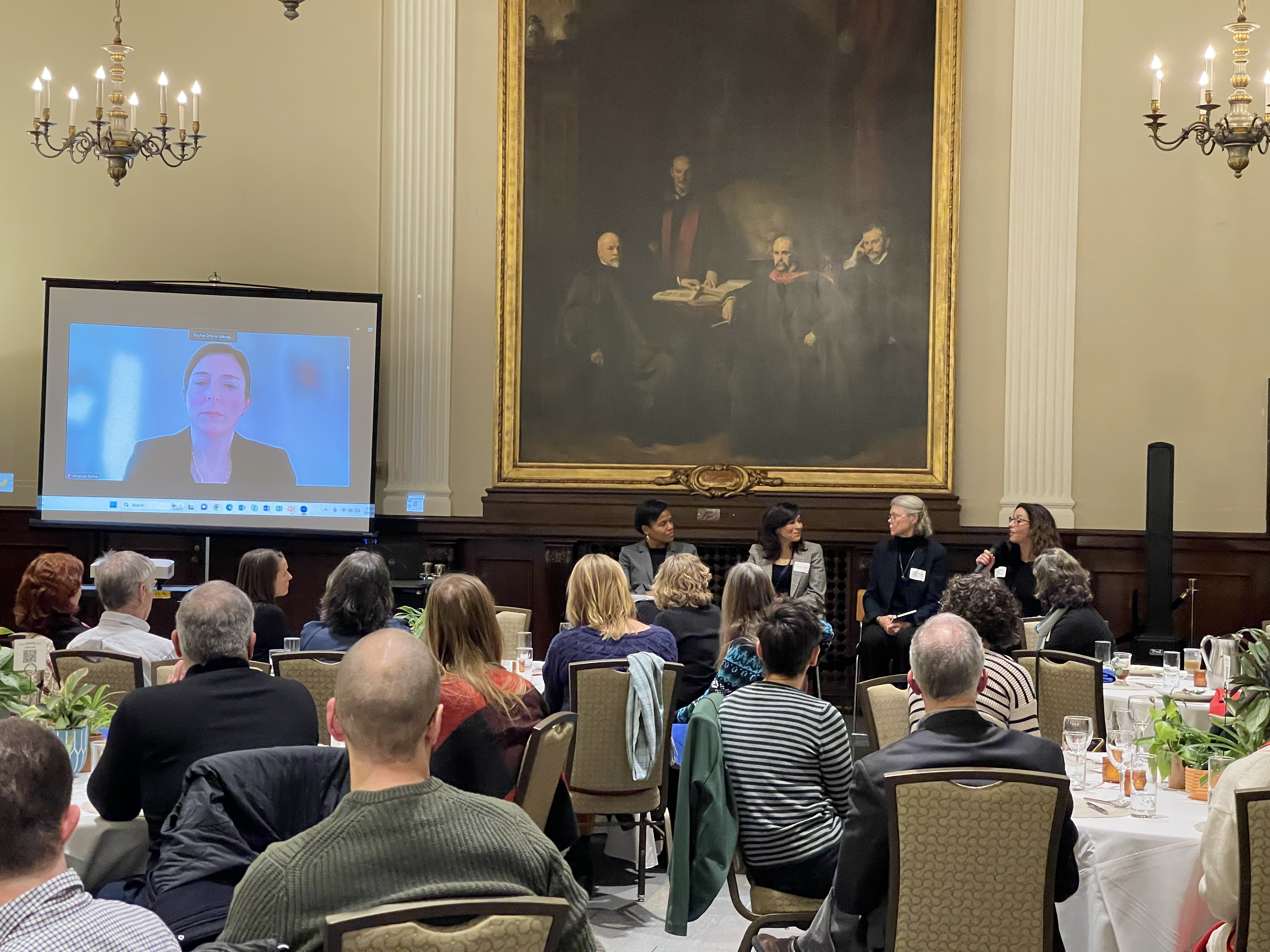
January Planetary Health Dinner
In January, a diverse panel of experts gathered with the Johns Hopkins Institute for Planetary Health’s affiliated faculty, staff, and students to explore the implications of the current political landscape on Planetary Health policy and how municipal, state, national, and international efforts can advance in uncertain times.
Speakers included:
- Keshia Pollack Porter, Bloomberg Centennial Chair Professor, Department of Health Policy and Management (Bloomberg School of Public Health)
- Amanda Daflos, Executive Director, Bloomberg Center for Public Innovation
- Sonia Angell, Distinguished Professor of Practice, Department of Epidemiology (BSPH), Department of Environmental Health and Engineering (BSPH)
- Shere Abbott, Teaching Professor, Department of Environmental Health and Engineering
- Francisca Rojas, Academic Practice Director, Bloomberg Center for Public Innovation
“I like the way these dinners allow for personal connections as well as professional ones. The topics are always interesting and thought provoking. I come away with the sense that my mind has been opened and stretched in ways I did not expect.” — January Planetary Health Community Dinner Attendee
The discussion highlighted both obstacles and emerging opportunities for advancing Planetary Health including:
- Political Shifts as Catalysts for Action: Panelists reminded attendees that political transitions are inevitable. While these shifts can create uncertainty, they can also serve as powerful calls to action, providing new opportunities to drive progress on Planetary Health.
- Local-Level Leadership: Amidst partisan divisions and ideological polarization that can deter progress at the national government level, local-level politics have become promising engines of social and economic progress.
- Seeds of Transformation: The U.S. is already seeing transformative progress in areas related to Planetary Health. Many cities are shifting toward renewable energy sources, developing infrastructure to support non-motorized transportation, and engaging in innovative and regenerative urban design.
- The Value of Expertise: A pressing concern raised by the panel was the depletion of expertise in federal agencies. Panelists emphasized the need to focus on building the nation’s talent pool to ensure that future generations of public servants are equipped to tackle complex environmental challenges.
- Narrative and Communication: A key theme of the evening was the need to change the way individuals talk about Planetary Health. For instance, an air-quality index reading of 212 may be reported in areas affected by wildfires, but the public may struggle to understand its significance. At Johns Hopkins University, there is an opportunity to become “chief explainers” of complex environmental topics, bridging the gap between scientific language and public understanding.
Get Involved & Stay Connected
Local action is key to driving change—and it’s also good for your mental and emotional health. Research shows that finding community and taking action not only supports your well-being but also boosts the impact of your efforts. Here are some practical ways to engage locally, as suggested by Megan Latshaw, Faculty Co-director for JHIPH’s Education program:
- Join Groups & Coalitions: Engaging with like-minded organizations strengthens your ability to advocate for change. Some impactful local groups in Baltimore include:
- Take Small Steps: While large-scale change is important, it starts with individual actions that collectively add up to broader shifts—whether it’s reducing waste, using public transit, or advocating for local sustainability practices. Some examples of small steps include:
- Volunteering on a local non-profit or government committee
- Collaborating with local groups to draft policy statements or recommendations
- Gathering and presenting data on Planetary Health issues like air quality or water pollution
- Participating in advocacy days at your state or local Capitol
- Writing op-eds, letters to the editor, or blog posts to raise awareness about local issues
- Face Uncertainty & Overcome Imposter Syndrome: You don’t have to be an expert to make a difference. Local activism often thrives on the diverse perspectives of regular people who care deeply about their communities and the planet.
- Stay Informed: Join local networks like the B’More Just Transition Listserv to stay up to date on events, initiatives, and opportunities for engagement in your community. It’s a great way to learn about ongoing efforts and ways to get involved.
- Just Do It! Don’t wait for the “perfect” time or perfect plan. Get started, and the momentum will follow. Every action, no matter how small, makes a difference in moving towards a healthier planet.
JHIPH News & Opportunities
The early part of the dinner included a selection of updates relevant to our community, including:
- Insights & Impacts: Post-Election Debrief and Discussion— event recording now available
- JHIPH’s FY25-FY26 Strategic Plan— now available to view
- First-Year Seminars— applications to teach a course are due January 24, 2025
- Bloomberg Distinguished Professorships— announcing a new research cluster Planetary Health
- 2025 Planetary Health Nexus Awards— apply by February 14, 2025
- 6th Annual Sustainability Symposium— submit a proposal by February 3, 2025

Interested in learning more?
View the presentation slides from the January Planetary Health Dinner for more information

